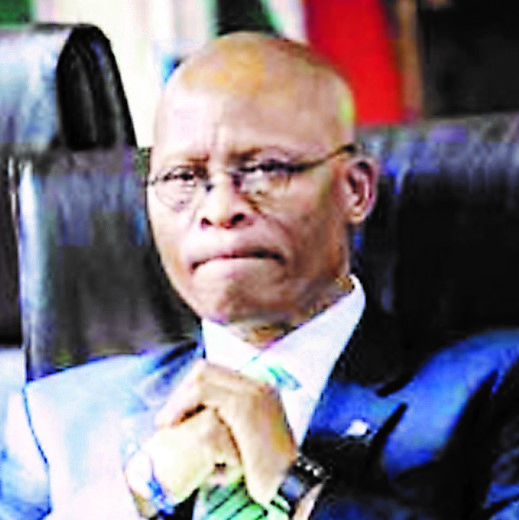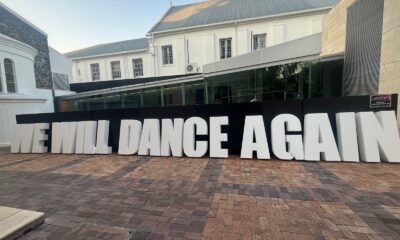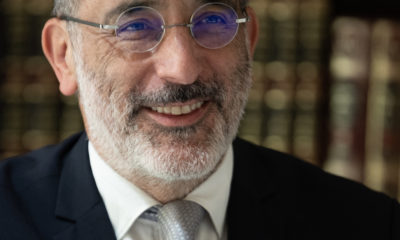
Banner

Chief justice slams anti-Israel group’s ‘underhand tactics’
Chief Justice Mogoeng Mogoeng hit back at Africa4Palestine in a 19-page affidavit this week, describing underhand tactics of twisting the truth and targeting him individually after he expressed support for Israel as well as the Palestinians in a recent webinar.
Following the Jerusalem Post webinar with South Africa’s Chief Rabbi Dr Warren Goldstein, Africa4Palestine submitted a complaint to South Africa’s Judicial Service Commission (JDC), accusing the chief justice of breaching the judicial code of conduct.
Africa4Palestine was formerly known as Boycott, Divestment, Sanctions (BDS) South Africa, but the group was expelled by the international BDS organisation last year after it didn’t adequately address sexual abuse allegations within the leadership of the organisation.
Mogoeng described the group’s “smear campaign” against him as similar to those used to silence political opponents during apartheid. He emphasised that in its affidavit, Africa4Palestine purposefully excluded some of what he said in the webinar to “achieve its goal of making an example of me to any who would dare differ from them”.
He claims these omissions, and the twisting of his words, are being used as weapons against him, and that he is being targeted by the organisation because he expressed love for Israel and Palestine, and his obligation to pray for peace.
“I never expressed any view on Zionism. This is a desperate twisting of what I said. Africa4Palestine knows this. This is why it was, in my opinion, very deliberate and intentional in leaving out the portion of my statement that contains my declaration of love for Palestine and the Palestinians.
“What must be guarded against is desperation to enforce agenda[s], by singling out a public figure to make an example of him or her, almost as if to say to all, ‘You better watch out. If we can deal with this one so viciously, just imagine what would become of you if you disagree with us,’” he wrote.
The SA Jewish Report has seen the Africa4Palestine affidavit, and confirms that the section of the webinar in which Mogoeng expressed support for both Israelis and Palestinians has been left out.
An advocate speaking on condition of anonymity says, “This is scurrilous. The chief justice made it clear that he supported both peoples. Excluding information, misleading the court, and quoting selectively to create an incomplete picture is a big ethical breach.”
A senior member of the legal profession in South Africa commented, “I think Africa4Palestine and the BDS movement are underpinned by an element of antisemitism. That being so, there is an inconstancy with how it deals with Israel/Palestine issues compared to how it deals with other serious violations of human rights, for example in Syria, Yemen, and other areas.
“Of course, as a general proposition, and in particular [regarding] the chief justice, one ought to be wary of involving oneself personally and in a judicial capacity with issues that are best left to other branches of the state. The chief justice’s comments in the webinar probably didn’t move into inappropriate realms. But of course, the BDS and Africa4Palestine movements would seize on any perceived ‘violation’ of what they perceive is the correct human rights stance. The chief justice, in responding in the heavy manner that he did, probably felt the inconsistencies that the BDS movement represents.”
Addressing Africa4Palestine’s argument that a judge shouldn’t speak on such issues, as stated in the rules found in the Code of Judicial Conduct of 2012, Mogoeng responded, “Article 12 isn’t a blind and purposeless banning order on judges from ever reflecting on foreign political controversies.” He points out that Justice Edwin Cameron commented on Israel/Palestine in 2015, but no one hauled him over the coals.
In the same context, according to Africa4Palestine’s logic, both former Deputy Chief Justice Dikgang Moseneke and the late chief justice, Pius Langa, should both be taken to the JDC for their direct involvement in mediating conflicts in Lesotho and the Fiji Islands respectively. He described another retired Constitutional Court judge as being deeply involved in local politics, even calling for the removal of a sitting president, and he, too, wasn’t criticised.
“Hypocrisy is a device we dare not institutionalise or normalise,” said the chief justice. “The approach of Africa4Palestine would certainly entrench hypocrisy and enable partiality and the possibility to quietly push sectional agendas.”
Mogoeng emphasised that, “The Masuku recusal issue has got nothing to do with what I said. It’s about hate speech,” referring to the argument that he would need to recuse himself from the case currently before the Constitutional Court because it addresses antisemitism.
“Only the Constitution, the law, and the facts will inform my decision on Masuku,” he said. He warned that Africa4Palestine “could reasonably be understood to be seeking to bring pressure to bear” on the matter. Furthermore, he wrote that Africa4Palestine’s approach could impinge on Christian South Africans’ rights to practice their religion.
Rowan Polovin, the national chairperson of the South African Zionist Federation (SAZF), said, “The SAZF is pleased that Chief Justice Mogoeng Mogoeng has stood firm and responded emphatically to Africa4Palestine’s disingenuous and contemptible complaint about his conduct. The chief justice’s response lucidly reiterates the fundamental constitutional rights and freedoms that are enjoyed by him and millions of South Africans with a religious and spiritual connection to the Holy Land. Any attempts by Africa4Palestine and others to undermine those rights should be vigorously rejected. The chief justice’s stance has set an example for all.”
For the full context of the chief justice’s argument, read his affidavit on: https://www.scribd.com/document/470724030/Response-by-CJ-Mogoeng-Africa-for-Palestine#from_embed










